Unit 2 It’s a nice day,isn’t it练习课件(共50张PPT)
文档属性
| 名称 | Unit 2 It’s a nice day,isn’t it练习课件(共50张PPT) |
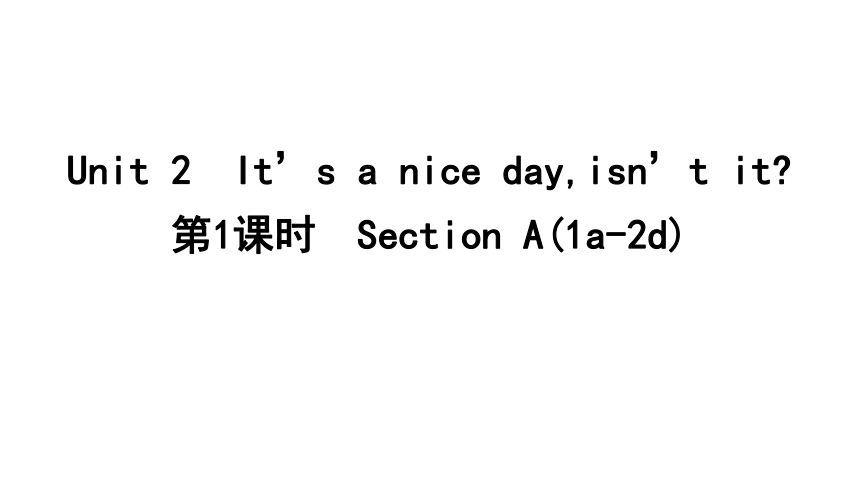
|
|
| 格式 | pptx | ||
| 文件大小 | 303.7KB | ||
| 资源类型 | 教案 | ||
| 版本资源 | 鲁教版 | ||
| 科目 | 英语 | ||
| 更新时间 | 2024-07-07 12:04:14 | ||
图片预览



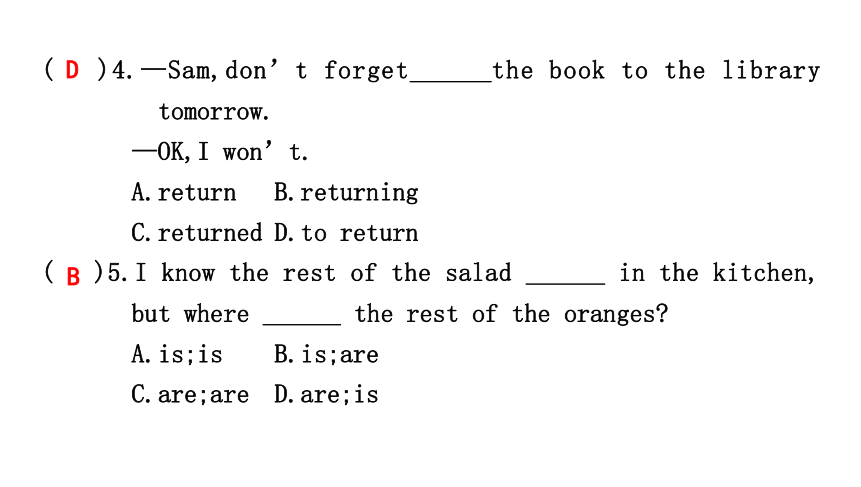
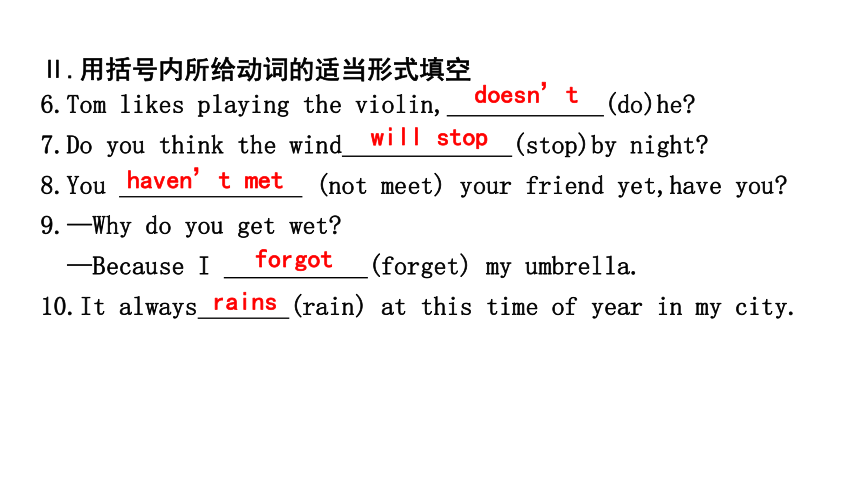
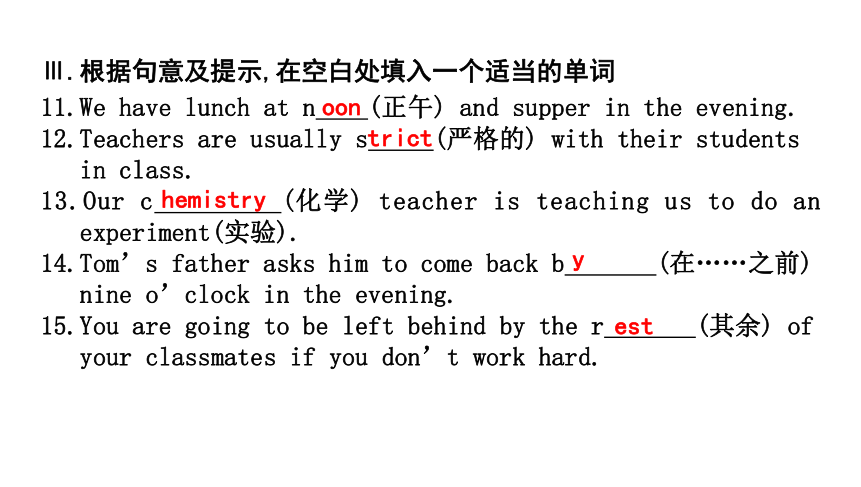
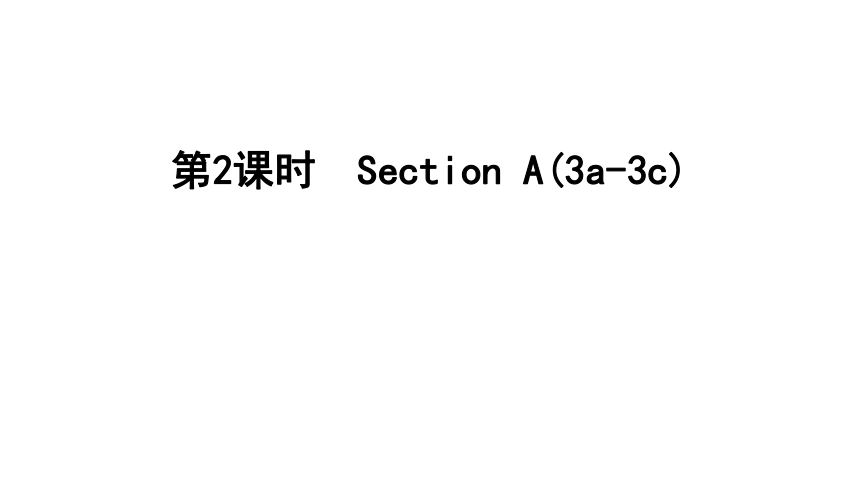
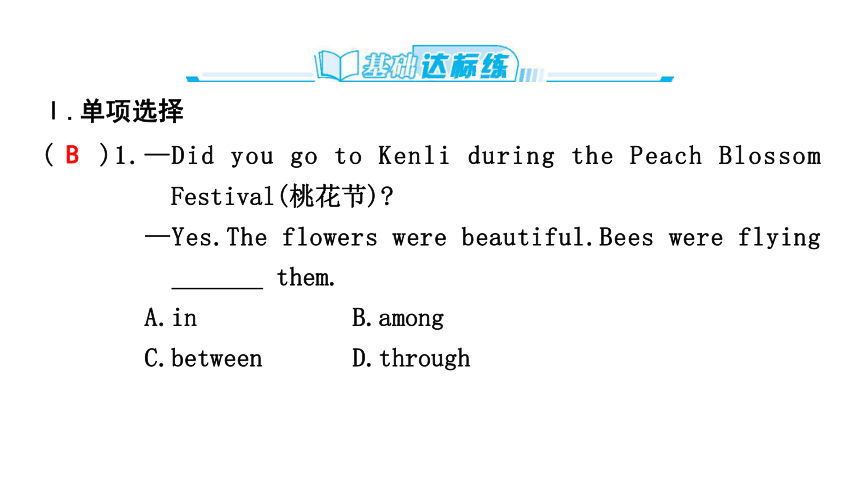
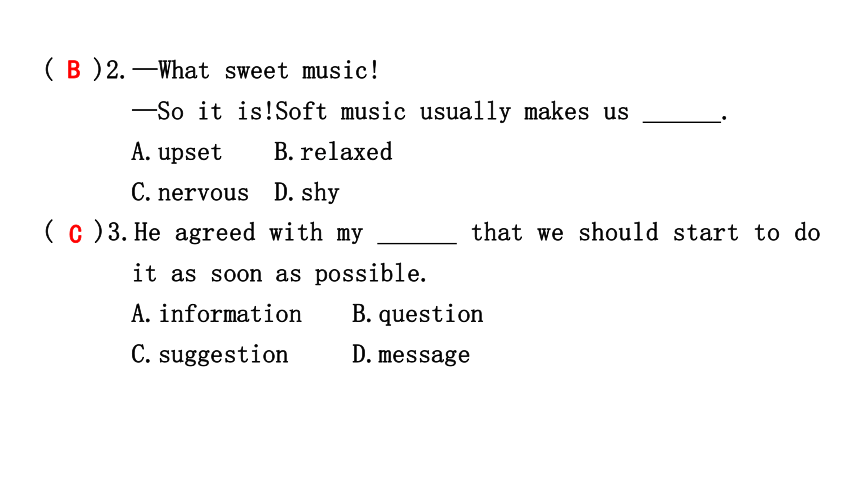
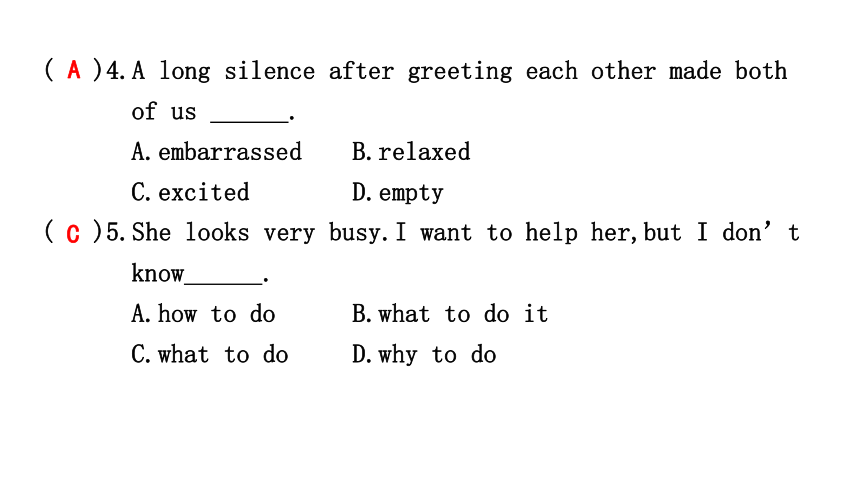

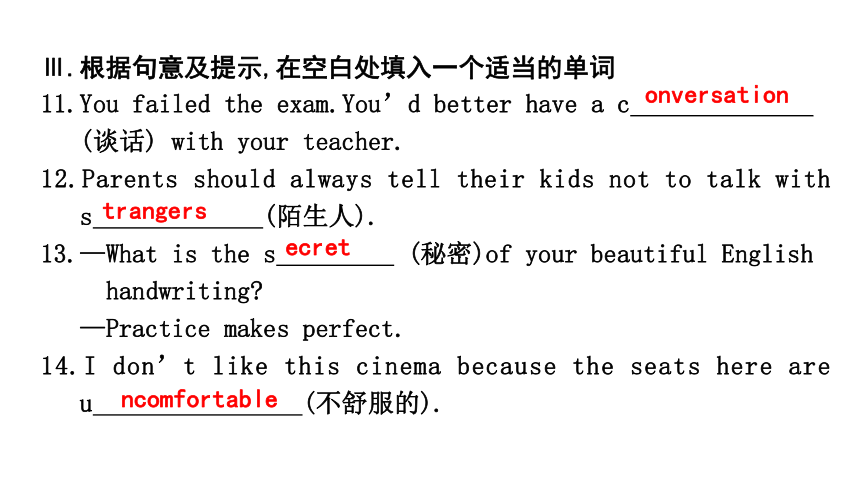
文档简介
(共50张PPT)
Unit 2 It’s a nice day,isn’t it
第1课时 Section A(1a-2d)
( )1.—Eric hurt his leg when playing tennis yesterday.I
hope he will get better soon.
— .
A.Hope not B.I hope so,too
C.I can’t stand it D.You are wrong
Ⅰ.单项选择
B
( )2.Mr.Smith is friendly us,but he is very strict
our studies.
A.for;with B.to;in
C.to;with D.with;with
( )3.—It’s nice to sit here chatting on the summer
evening,
—Yes,but it’s already 10 o’clock now.
A.isn’t it B.is it
C.does it D.doesn’t it
B
A
( )4.—Sam,don’t forget the book to the library
tomorrow.
—OK,I won’t.
A.return B.returning
C.returned D.to return
( )5.I know the rest of the salad in the kitchen,
but where the rest of the oranges
A.is;is B.is;are
C.are;are D.are;is
D
B
6.Tom likes playing the violin, (do)he
7.Do you think the wind (stop)by night
8.You (not meet) your friend yet,have you
9.—Why do you get wet
—Because I (forget) my umbrella.
10.It always (rain) at this time of year in my city.
Ⅱ.用括号内所给动词的适当形式填空
doesn’t
will stop
haven’t met
forgot
rains
11.We have lunch at n (正午) and supper in the evening.
12.Teachers are usually s (严格的) with their students
in class.
13.Our c (化学) teacher is teaching us to do an
experiment(实验).
14.Tom’s father asks him to come back b (在……之前)
nine o’clock in the evening.
15.You are going to be left behind by the r (其余) of
your classmates if you don’t work hard.
Ⅲ.根据句意及提示,在空白处填入一个适当的单词
oon
trict
hemistry
y
est
第2课时 Section A(3a-3c)
( )1.—Did you go to Kenli during the Peach Blossom
Festival(桃花节)
—Yes.The flowers were beautiful.Bees were flying
them.
A.in B.among
C.between D.through
Ⅰ.单项选择
B
( )2.—What sweet music!
—So it is!Soft music usually makes us .
A.upset B.relaxed
C.nervous D.shy
( )3.He agreed with my that we should start to do
it as soon as possible.
A.information B.question
C.suggestion D.message
B
C
( )4.A long silence after greeting each other made both
of us .
A.embarrassed B.relaxed
C.excited D.empty
( )5.She looks very busy.I want to help her,but I don’t
know .
A.how to do B.what to do it
C.what to do D.why to do
A
C
6.To keep healthy,the doctor suggests (do) more
exercise.
7.It is natural for many people (dream) of being
rich.
8.I kept (think) about what to do next.
9.I heard Tom (read)English as I went past the
classroom.
10.Thank you for (invite)me to have dinner with you.
Ⅱ.用括号内所给动词的适当形式填空
doing
to dream
thinking
reading
inviting
11.You failed the exam.You’d better have a c .
(谈话) with your teacher.
12.Parents should always tell their kids not to talk with
s (陌生人).
13.—What is the s (秘密)of your beautiful English
handwriting
—Practice makes perfect.
14.I don’t like this cinema because the seats here are
u (不舒服的).
Ⅲ.根据句意及提示,在空白处填入一个适当的单词
onversation
trangers
ecret
ncomfortable
15.There is an old piano in the c (角落) of the living
room.
orner
第3课时 Section B(1a-1e)
( )1.Tell me about ,Jeff.
A.yourself B.your
C.you D.herself
Ⅰ.单项选择
A
( )2.—Steven had nothing for breakfast this morning,
—No,because he had a fever.
A.hadn’t he B.had he
C.didn’t he D.did he
( )3.—Excuse me, is this T-shirt
—It’s 88 yuan.
A.how much B.how many
C.how long D.how old
D
A
( )4.—How much is your coat
—Oh,it me 100 yuan.
A.cost B.spent
C.paid D.took
A
5.Mary often works as a volunteer in the c (社区).
6.Next week is full for me.I have lots of meetings to
a (参加).
7.When you wait for a bus at the bus stop,you should wait
in l (队伍).
8.How much does this mobile phone c (花费).
9.It was so c (拥挤的) on the road that it took me
five hours’ driving to the railway station.
Ⅱ.根据句意及提示,在空白处填入一个适当的单词
ommunity
ttend
ine
ost
rowded
第4课时 Section B(2a-2e)
( )1.If you study hard,you’ll have a of winning
in the competition.
A.choice B.chance
C.decision D.direction
Ⅰ.单项选择
B
( )2.On the first day of school,each of us made an
.
A.expression B.introduction
C.introduce D.information
( )3.It is necessary for us to go to school to
learn English.
A.everyday;every day
B.everyday;everyday
C.every day;everyday
D.every day;every day
B
C
( )4.I can see she’s to avoid my eyes.
A.walked along her way;meet
B.getting in the way;to meet
C.going out of her way;meeting
D.walking on the way;meeting
C
( )5.—I’m dreaming about getting on the sunny
beach in Hawaii for vacation!
—Well,that sounds really !
A.relaxed;relaxed B.relaxing;relaxing
C.relaxed;relaxing D.relaxing;relaxingly
( )6.Playing too many computer games bad for our
eyes.
A.are B.is
C.am D.be
C
B
( )7.My favorite teacher is Mr.Smith,because he is very
.
A.humorous B.empty
C.basic D.general
( )8.—You have seen the new film,
—Yes.I saw it last weekend.
A.were you B.weren’t you
C.have you D.haven’t you
A
D
( )9.— do you that film
—It’s wonderful.
A.How;think of B.What;like
C.How;think D.What;think of
( )10.Food safety is a serious in our country.We
should try to solve it.
A.subject B.program
C.problem D.opinion
D
C
11.—Could you tell me what the sign means
—Keep a certain distance from others in public places
to avoid (catch) the virus.
12.He likes watching TV when (stay) at home alone.
13.The important thing is to give me a chance (have)
a try.
14.Don’t make the baby (cry) anymore.
15.A meeting will (hold) by us tomorrow.
Ⅱ.用括号内所给动词的适当形式填空
catching
staying
to have
cry
be held
16.Don’t go to the shop.The shopkeeper often cheats
c (顾客).
17.Hey!What are you listening to It’s a p (私密的)
conversation.
18.My father isn’t at home.He is in Beijing on b .
(生意).
19.Our fridge is e (空的).Can you buy some food
Ⅲ.根据句意及提示,在空白处填入一个适当的单词
ustomers
rivate
usiness
mpty
20.His father is a w (工人) and he works in a shoe
factory.
21.A d (对话) is a conversation between two people
in a book,film or play.
22.The more you think about others,the more h (有
用的) you will be.
23.A good talk may start with b (基本的) greetings or
just a smile.
orker
ialogue
elpful
asic
24.All these changes happened over a p (时期)of time.
25.Ice and snow are different f (形式) of water.
eriod
orms
26.为了避免撞到卡车上,他开车撞到了墙上,胳膊伤得很厉害。
To hitting the truck,he ran his car into the
wall and his arm was hurt.
27.让别人微笑可以使他们感到放松。
other people smile can make them .
.
28.在大部分文化中,微笑和让谈话轻松幽默是很重要的。
In most culture,it is important and
the conversation light and .
Ⅳ.完成/翻译句子
avoid
badly
feel
Making
relaxed
to
smile
keep
humorous
29.Can you tell me how to break the ice
30.We should give him a chance to take the test.
你能告诉我如何打破沉默吗
我们应该给他一个参加考试的机会。
第5课时 Section B(3a-3b)
——单元话题写作指导
写作话题 如何与他人交流
具体内容 从闲谈的话题、注意事项等方面进行描述,通过正确的交谈方式达到与别人成功交流的目的
注意事项 短文主要是用一般现在时和第一、二人称
(1)It looks like rain,doesn’t it
课文重现
(2)Then I nervously stood in a corner,not quite sure what
to do.
(3)You haven’t met your teachers yet,have you
(4)This is a great party,isn’t it
(5)Things we should not discuss can also depend on
culture.
(1)放学后去打篮球是个好主意。
It’s a good idea to play basketball after school.
亮点句型
(2)你们不应该谈论私人问题,因为你们彼此不是很了解。
You shouldn’t discuss private matters because you
don’t know each other well.
(3)当然,在闲谈中也有许多要避免的话题。
Of course,there are also lots of topics to avoid
during small talk.
(4)当我们的朋友与我们分享他们的快乐和烦恼时,我们也应该认真倾
听他们的心声。
When our friends share their happiness and trouble with
us,we should listen to them carefully as well.
在我们的日常生活中,倾听是开启人们心灵的钥匙。当拥有快乐时,我们彼此需要分享;当遇到烦恼时,我们更需要彼此倾听。怎样才能成为一个好的倾听者呢 请以“How to be a good
listener ”为题写一篇英语短文。
要求:词数100左右。
词汇提示:communicate,share,happiness,respect(尊重),show an interest
1.写作要求
(1)体裁:说明文
2.思路点拨
(2)时态:一般现在时
(3)人称:第一人称
(4)写作导图:
How to be a good listener
Listening is the key to good communication with others.We hope our friends will listen to us carefully when we are talking to them.When our friends share their happiness and trouble with us,we should listen to them
carefully as well.
3.范文借鉴
First of all,we must show our respect to others.We should never stop others till they finish their talk.
Second,we need to listen to the speaker carefully and make sure what the speaker is saying.It’s important for us to listen for the main points of the speaker.Finally,show an interest in what the speaker is saying.In this way,the
speaker may feel comfortable.
In a word,good listening can really make us get closer
to each other.
单元语法突破(Grammar Focus-4c)
反意疑问句
1.反意疑问句的构成
肯定的陈述句+否定的简短问句(即前肯后否)
Miss Li runs every morning,doesn’t she
否定的陈述句+肯定的简短问句(即前否后肯)
The girl can’t play the piano,can she
2.特殊句型的反意疑问句
(1)祈使句的反意疑问句:肯定祈使句用 will you或won’t you提
问;以Don’t开始的否定祈使句,表示“不要……”,用will you
提问。Let’s引导的祈使句表示“建议”,用shall we提问;陈
述部分为Let us...时,问句部分用will you。如:
Tell me the way to the cinema,will/won’t you
告诉我去电影院的路,好吗
(2)如果陈述句中包含有如下否定意义的词,如
seldom,hardly,never,little,few,nowhere,nothing等,则简短
问句用肯定形式。如:
Tom seldom walks to school,does he
汤姆很少步行去上学,对吗
(3)如果陈述句中仅包含有否定前缀的词,则简短问句中用否定形
式。如:
He looks unhappy,doesn’t he
他看上去不高兴,不是吗
(4)陈述部分主语是指示代词these,those时,疑问部分主语为they;若
陈述部分主语为不定代词everybody,anyone,somebody,
nobody,no one等时,疑问部分主语常用复数they,有时也用单数
he。如:
Everyone knows the answer,don’t they (doesn’t he )每个
人都知道答案,不是吗
(5)陈述部分主语是指示代词this,that或不定代词everything,
nothing等时,疑问部分主语用it。如:
Nothing is difficult if you put your heart into it,
is it 世上无难事,只怕有心人,对吗
(6)当陈述部分为there be句型时,疑问部分则用be+there。如:
There was nothing in the room,was there
房间里什么也没有,是吗
3.反意疑问句的回答
对反意疑问句的回答,如果前面的陈述是肯定结构,只要该陈述
与事实相符,就用yes;只要该陈述与事实不符,就用no。
【温馨提示】 要特别注意陈述句是否定结构,反意疑问句用肯定式提问时,答语yes或no与汉语意思正好相反。yes要译成“不”,no要译成“是”。如:
—Tom’s never been late for school,has he
汤姆上学从来不迟到,是吗
—No,he hasn’t.
是的,他不迟到。
单项选择
( )1.—It is rude to ask direct questions,
—Yes,but I think it’s OK to your close friends.
A.isn’t it B.doesn’t it
C.does it D.is it
A
( )2.—The rain is too heavy.We can hardly go out,can we
— ,or we’ll get wet and have a cold.
A.No,we can’t B.Yes,we can’t
C.Yes,we can D.No,we can
( )3.—Wang Bin has never stopped smoking, he
— ,he hasn’t,although his wife always advises
him not to smoke.
A.has;Yes B.hasn’t;Yes
C.has;No D.hasn’t;No
A
C
( )4.—There is nothing left in the fridge,
— .Let’s go to the supermarket to buy some.
A.is there;Yes B.isn’t there;Yes
C.is there;No D.isn’t there;No
( )5.Jerry often goes to the beach to relax,
A.doesn’t he B.does he
C.do they D.don’t they
C
A
Unit 2 It’s a nice day,isn’t it
第1课时 Section A(1a-2d)
( )1.—Eric hurt his leg when playing tennis yesterday.I
hope he will get better soon.
— .
A.Hope not B.I hope so,too
C.I can’t stand it D.You are wrong
Ⅰ.单项选择
B
( )2.Mr.Smith is friendly us,but he is very strict
our studies.
A.for;with B.to;in
C.to;with D.with;with
( )3.—It’s nice to sit here chatting on the summer
evening,
—Yes,but it’s already 10 o’clock now.
A.isn’t it B.is it
C.does it D.doesn’t it
B
A
( )4.—Sam,don’t forget the book to the library
tomorrow.
—OK,I won’t.
A.return B.returning
C.returned D.to return
( )5.I know the rest of the salad in the kitchen,
but where the rest of the oranges
A.is;is B.is;are
C.are;are D.are;is
D
B
6.Tom likes playing the violin, (do)he
7.Do you think the wind (stop)by night
8.You (not meet) your friend yet,have you
9.—Why do you get wet
—Because I (forget) my umbrella.
10.It always (rain) at this time of year in my city.
Ⅱ.用括号内所给动词的适当形式填空
doesn’t
will stop
haven’t met
forgot
rains
11.We have lunch at n (正午) and supper in the evening.
12.Teachers are usually s (严格的) with their students
in class.
13.Our c (化学) teacher is teaching us to do an
experiment(实验).
14.Tom’s father asks him to come back b (在……之前)
nine o’clock in the evening.
15.You are going to be left behind by the r (其余) of
your classmates if you don’t work hard.
Ⅲ.根据句意及提示,在空白处填入一个适当的单词
oon
trict
hemistry
y
est
第2课时 Section A(3a-3c)
( )1.—Did you go to Kenli during the Peach Blossom
Festival(桃花节)
—Yes.The flowers were beautiful.Bees were flying
them.
A.in B.among
C.between D.through
Ⅰ.单项选择
B
( )2.—What sweet music!
—So it is!Soft music usually makes us .
A.upset B.relaxed
C.nervous D.shy
( )3.He agreed with my that we should start to do
it as soon as possible.
A.information B.question
C.suggestion D.message
B
C
( )4.A long silence after greeting each other made both
of us .
A.embarrassed B.relaxed
C.excited D.empty
( )5.She looks very busy.I want to help her,but I don’t
know .
A.how to do B.what to do it
C.what to do D.why to do
A
C
6.To keep healthy,the doctor suggests (do) more
exercise.
7.It is natural for many people (dream) of being
rich.
8.I kept (think) about what to do next.
9.I heard Tom (read)English as I went past the
classroom.
10.Thank you for (invite)me to have dinner with you.
Ⅱ.用括号内所给动词的适当形式填空
doing
to dream
thinking
reading
inviting
11.You failed the exam.You’d better have a c .
(谈话) with your teacher.
12.Parents should always tell their kids not to talk with
s (陌生人).
13.—What is the s (秘密)of your beautiful English
handwriting
—Practice makes perfect.
14.I don’t like this cinema because the seats here are
u (不舒服的).
Ⅲ.根据句意及提示,在空白处填入一个适当的单词
onversation
trangers
ecret
ncomfortable
15.There is an old piano in the c (角落) of the living
room.
orner
第3课时 Section B(1a-1e)
( )1.Tell me about ,Jeff.
A.yourself B.your
C.you D.herself
Ⅰ.单项选择
A
( )2.—Steven had nothing for breakfast this morning,
—No,because he had a fever.
A.hadn’t he B.had he
C.didn’t he D.did he
( )3.—Excuse me, is this T-shirt
—It’s 88 yuan.
A.how much B.how many
C.how long D.how old
D
A
( )4.—How much is your coat
—Oh,it me 100 yuan.
A.cost B.spent
C.paid D.took
A
5.Mary often works as a volunteer in the c (社区).
6.Next week is full for me.I have lots of meetings to
a (参加).
7.When you wait for a bus at the bus stop,you should wait
in l (队伍).
8.How much does this mobile phone c (花费).
9.It was so c (拥挤的) on the road that it took me
five hours’ driving to the railway station.
Ⅱ.根据句意及提示,在空白处填入一个适当的单词
ommunity
ttend
ine
ost
rowded
第4课时 Section B(2a-2e)
( )1.If you study hard,you’ll have a of winning
in the competition.
A.choice B.chance
C.decision D.direction
Ⅰ.单项选择
B
( )2.On the first day of school,each of us made an
.
A.expression B.introduction
C.introduce D.information
( )3.It is necessary for us to go to school to
learn English.
A.everyday;every day
B.everyday;everyday
C.every day;everyday
D.every day;every day
B
C
( )4.I can see she’s to avoid my eyes.
A.walked along her way;meet
B.getting in the way;to meet
C.going out of her way;meeting
D.walking on the way;meeting
C
( )5.—I’m dreaming about getting on the sunny
beach in Hawaii for vacation!
—Well,that sounds really !
A.relaxed;relaxed B.relaxing;relaxing
C.relaxed;relaxing D.relaxing;relaxingly
( )6.Playing too many computer games bad for our
eyes.
A.are B.is
C.am D.be
C
B
( )7.My favorite teacher is Mr.Smith,because he is very
.
A.humorous B.empty
C.basic D.general
( )8.—You have seen the new film,
—Yes.I saw it last weekend.
A.were you B.weren’t you
C.have you D.haven’t you
A
D
( )9.— do you that film
—It’s wonderful.
A.How;think of B.What;like
C.How;think D.What;think of
( )10.Food safety is a serious in our country.We
should try to solve it.
A.subject B.program
C.problem D.opinion
D
C
11.—Could you tell me what the sign means
—Keep a certain distance from others in public places
to avoid (catch) the virus.
12.He likes watching TV when (stay) at home alone.
13.The important thing is to give me a chance (have)
a try.
14.Don’t make the baby (cry) anymore.
15.A meeting will (hold) by us tomorrow.
Ⅱ.用括号内所给动词的适当形式填空
catching
staying
to have
cry
be held
16.Don’t go to the shop.The shopkeeper often cheats
c (顾客).
17.Hey!What are you listening to It’s a p (私密的)
conversation.
18.My father isn’t at home.He is in Beijing on b .
(生意).
19.Our fridge is e (空的).Can you buy some food
Ⅲ.根据句意及提示,在空白处填入一个适当的单词
ustomers
rivate
usiness
mpty
20.His father is a w (工人) and he works in a shoe
factory.
21.A d (对话) is a conversation between two people
in a book,film or play.
22.The more you think about others,the more h (有
用的) you will be.
23.A good talk may start with b (基本的) greetings or
just a smile.
orker
ialogue
elpful
asic
24.All these changes happened over a p (时期)of time.
25.Ice and snow are different f (形式) of water.
eriod
orms
26.为了避免撞到卡车上,他开车撞到了墙上,胳膊伤得很厉害。
To hitting the truck,he ran his car into the
wall and his arm was hurt.
27.让别人微笑可以使他们感到放松。
other people smile can make them .
.
28.在大部分文化中,微笑和让谈话轻松幽默是很重要的。
In most culture,it is important and
the conversation light and .
Ⅳ.完成/翻译句子
avoid
badly
feel
Making
relaxed
to
smile
keep
humorous
29.Can you tell me how to break the ice
30.We should give him a chance to take the test.
你能告诉我如何打破沉默吗
我们应该给他一个参加考试的机会。
第5课时 Section B(3a-3b)
——单元话题写作指导
写作话题 如何与他人交流
具体内容 从闲谈的话题、注意事项等方面进行描述,通过正确的交谈方式达到与别人成功交流的目的
注意事项 短文主要是用一般现在时和第一、二人称
(1)It looks like rain,doesn’t it
课文重现
(2)Then I nervously stood in a corner,not quite sure what
to do.
(3)You haven’t met your teachers yet,have you
(4)This is a great party,isn’t it
(5)Things we should not discuss can also depend on
culture.
(1)放学后去打篮球是个好主意。
It’s a good idea to play basketball after school.
亮点句型
(2)你们不应该谈论私人问题,因为你们彼此不是很了解。
You shouldn’t discuss private matters because you
don’t know each other well.
(3)当然,在闲谈中也有许多要避免的话题。
Of course,there are also lots of topics to avoid
during small talk.
(4)当我们的朋友与我们分享他们的快乐和烦恼时,我们也应该认真倾
听他们的心声。
When our friends share their happiness and trouble with
us,we should listen to them carefully as well.
在我们的日常生活中,倾听是开启人们心灵的钥匙。当拥有快乐时,我们彼此需要分享;当遇到烦恼时,我们更需要彼此倾听。怎样才能成为一个好的倾听者呢 请以“How to be a good
listener ”为题写一篇英语短文。
要求:词数100左右。
词汇提示:communicate,share,happiness,respect(尊重),show an interest
1.写作要求
(1)体裁:说明文
2.思路点拨
(2)时态:一般现在时
(3)人称:第一人称
(4)写作导图:
How to be a good listener
Listening is the key to good communication with others.We hope our friends will listen to us carefully when we are talking to them.When our friends share their happiness and trouble with us,we should listen to them
carefully as well.
3.范文借鉴
First of all,we must show our respect to others.We should never stop others till they finish their talk.
Second,we need to listen to the speaker carefully and make sure what the speaker is saying.It’s important for us to listen for the main points of the speaker.Finally,show an interest in what the speaker is saying.In this way,the
speaker may feel comfortable.
In a word,good listening can really make us get closer
to each other.
单元语法突破(Grammar Focus-4c)
反意疑问句
1.反意疑问句的构成
肯定的陈述句+否定的简短问句(即前肯后否)
Miss Li runs every morning,doesn’t she
否定的陈述句+肯定的简短问句(即前否后肯)
The girl can’t play the piano,can she
2.特殊句型的反意疑问句
(1)祈使句的反意疑问句:肯定祈使句用 will you或won’t you提
问;以Don’t开始的否定祈使句,表示“不要……”,用will you
提问。Let’s引导的祈使句表示“建议”,用shall we提问;陈
述部分为Let us...时,问句部分用will you。如:
Tell me the way to the cinema,will/won’t you
告诉我去电影院的路,好吗
(2)如果陈述句中包含有如下否定意义的词,如
seldom,hardly,never,little,few,nowhere,nothing等,则简短
问句用肯定形式。如:
Tom seldom walks to school,does he
汤姆很少步行去上学,对吗
(3)如果陈述句中仅包含有否定前缀的词,则简短问句中用否定形
式。如:
He looks unhappy,doesn’t he
他看上去不高兴,不是吗
(4)陈述部分主语是指示代词these,those时,疑问部分主语为they;若
陈述部分主语为不定代词everybody,anyone,somebody,
nobody,no one等时,疑问部分主语常用复数they,有时也用单数
he。如:
Everyone knows the answer,don’t they (doesn’t he )每个
人都知道答案,不是吗
(5)陈述部分主语是指示代词this,that或不定代词everything,
nothing等时,疑问部分主语用it。如:
Nothing is difficult if you put your heart into it,
is it 世上无难事,只怕有心人,对吗
(6)当陈述部分为there be句型时,疑问部分则用be+there。如:
There was nothing in the room,was there
房间里什么也没有,是吗
3.反意疑问句的回答
对反意疑问句的回答,如果前面的陈述是肯定结构,只要该陈述
与事实相符,就用yes;只要该陈述与事实不符,就用no。
【温馨提示】 要特别注意陈述句是否定结构,反意疑问句用肯定式提问时,答语yes或no与汉语意思正好相反。yes要译成“不”,no要译成“是”。如:
—Tom’s never been late for school,has he
汤姆上学从来不迟到,是吗
—No,he hasn’t.
是的,他不迟到。
单项选择
( )1.—It is rude to ask direct questions,
—Yes,but I think it’s OK to your close friends.
A.isn’t it B.doesn’t it
C.does it D.is it
A
( )2.—The rain is too heavy.We can hardly go out,can we
— ,or we’ll get wet and have a cold.
A.No,we can’t B.Yes,we can’t
C.Yes,we can D.No,we can
( )3.—Wang Bin has never stopped smoking, he
— ,he hasn’t,although his wife always advises
him not to smoke.
A.has;Yes B.hasn’t;Yes
C.has;No D.hasn’t;No
A
C
( )4.—There is nothing left in the fridge,
— .Let’s go to the supermarket to buy some.
A.is there;Yes B.isn’t there;Yes
C.is there;No D.isn’t there;No
( )5.Jerry often goes to the beach to relax,
A.doesn’t he B.does he
C.do they D.don’t they
C
A
同课章节目录
- Unit 1 When was heborn?
- Section A
- Section B
- Unit 2 It's a nice day, isn't it?
- Section A
- Section B
- Unit 3 Where would you like to visit?
- Section A
- Section B
- Unit 4 How can we become good learners?
- Section A
- Section B
- Unit 5 I think that mooncakes are delicious!
- Section A
- Section B
- Unit 6 Could you please tell me where the restroom
- Section A
- Section B
- Unit 7 I used to be afraid of the dark.
- Section A
- Section B
- Unit 8 What are the shirts made of?
- Section A
- Section B
